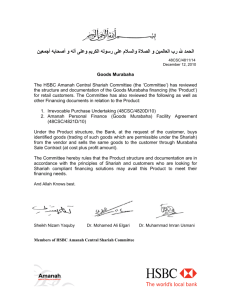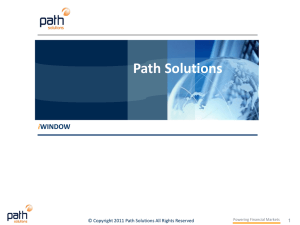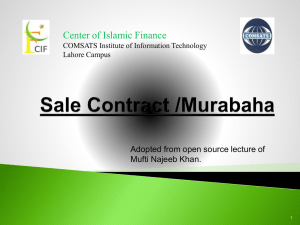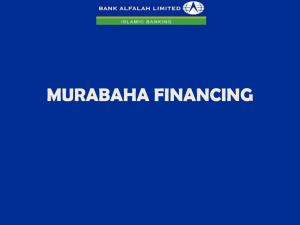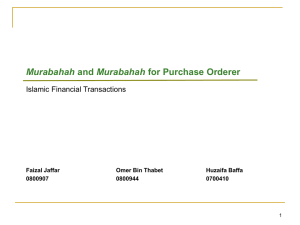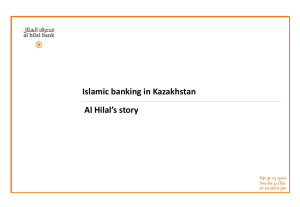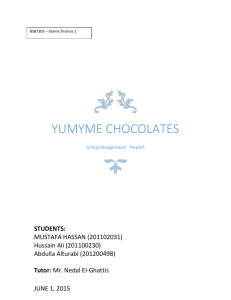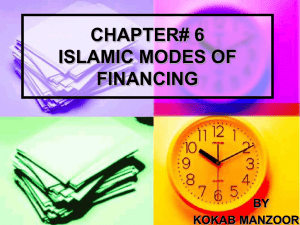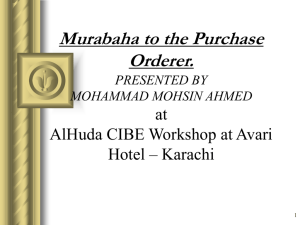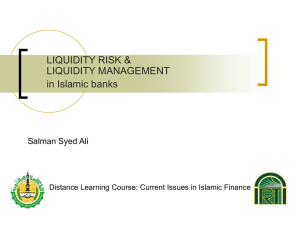3) BSB7303 Islamic finance group assignment
advertisement
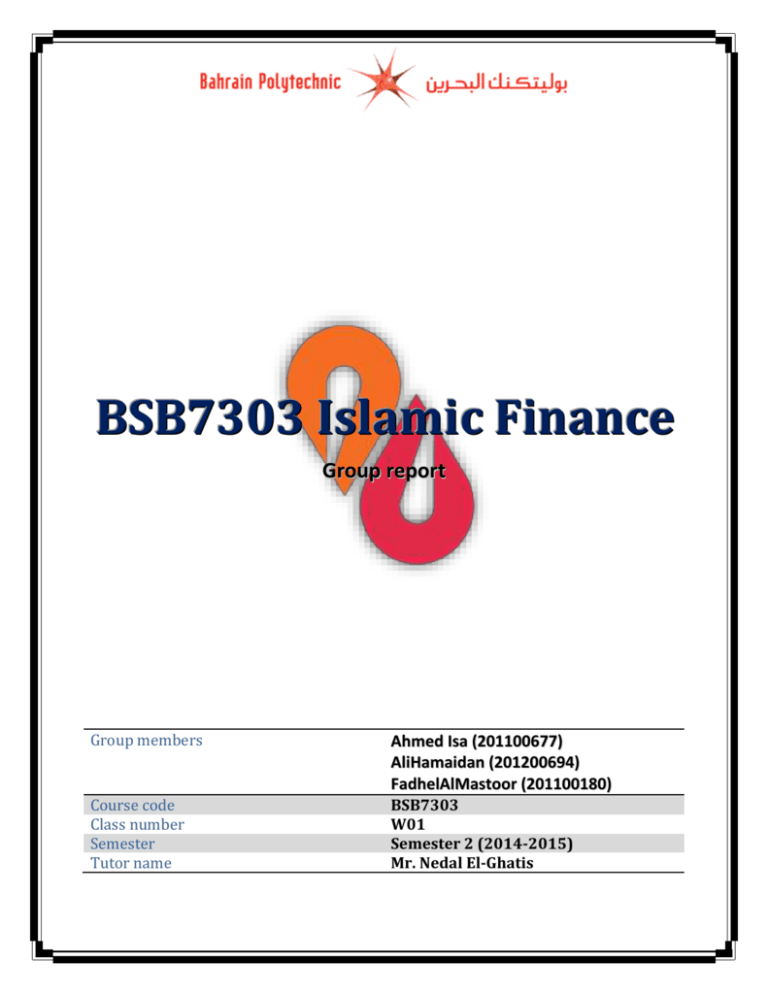
BSB7303 Islamic Finance Group report Group members Ahmed Isa (201100677) AliHamaidan (201200694) FadhelAlMastoor (201100180) Course code Class number Semester Tutor name BSB7303 W01 Semester 2 (2014-2015) Mr. Nedal El-Ghatis Contents Introduction .................................................................................................................................... 3 Part 1: Definitions and legal/Sharia'a basis of Murabaha Contract ............................................... 3 Part 2: Advantages and disadvantages of Murabaha contract ...................................................... 4 Part 3: The required forms and documents in AlBaraka bank for Murabaha contract ................. 6 Part 4: Procedures for providing the money .................................................................................. 7 Part 5: The risks involved in Murabaha contract and their mitigation ........................................ 10 1. Liquidity Risk .......................................................................................................................... 10 2. Settlement risk ...................................................................................................................... 11 3. Credit risk .............................................................................................................................. 11 4. Market Risk............................................................................................................................ 12 5. Operational risk ..................................................................................................................... 13 Conclusion .................................................................................................................................... 13 References .................................................................................................................................... 14 Appendices ................................................................................................................................... 15 P a g e |2 Introduction: In the following report AlBaraka Islamic Bank has been selected to identify the best method of finance to fund the proposal given to us by the customer, the client seeks to establish a factory named Yumyme chocolate factory. Based on the research and interviews that had been conducted with AlBaraka Islamic Bank, while taking in consideration the contracts/services offered by the bank, Murabaha contract had been identified as the most suitable mode to fund this particular business ( Yumyme chocolate factory). In addition, the report will include a discussion about the reasons behind choosing this mode of finance rather than others and these reasons are indicated with the required documents and forms that are used in the various stages of Murabaha. Nevertheless, several risks regarding Murabaha financing had been identified with highlighting a variety of ways to mitigate or reduce the effect of these risks. Part 1: Definitions and legal/Sharia'a basis of Murabaha Contract Murabaha is an Islamic Mode of asset-finance with a predetermined profit and fixed terms, used to finance the acquisition of assets based on long term or short term basis, it is also known as a trust sale of cost- plus sale basis, where the bank purchases a specific asset described by the customer, and after the bank receives the ownership of the specified asset, it sells it to the customer on the buying price *cost price* plus a profit rate pre agreed on between the bank and the customer in the contract (AlBaraka, 2013). Legal basis of Murabaha contract: The legitimacy of Murabaha Contract is comprehended from different sources: 1. The Quran permitted sale and trade, Quoting The Quran: “…and Allah permitted trade and prohibited usury” (2:282). “Allah has permitted sale and prohibited riba” (al-Baqarah: 275) “It is no sin for you that ye seek the bounty of your Lord by trading”(al-Baqarah: 198) (Malaysia, 2009) 2. The Sunnah of Prophet Mohammed (SAW): in general, selling and trading is permissible in Islam as long as the item being traded is sharia’ compliant, therefore Murabaha contract is deemed to be permissible and based on what The Prophet Mohammed said (SAW)“The best earning is P a g e |3 what man earns with his own hands and from a permissible trade” (Narrated by Hakim)(Islamic Banking, 2006). 3. Legitimacy of Murabaha contract depends on the consent of the majority Muslim jurists, considering the regulators of Sharia’ law in The Kingdom of Bahrain which includes; The Maliki School, The Shafii School, and The Jaafaari School, Since the primary source of these schools is derived from The Quran and The Sunnah of Prophet Mohammed, Murabaha contract is permissible (Islamic-Laws, n.d). 4. Analogy (Qiyas): in case of lack of resource or direct text from the Quran and the Sunnah, a judgment can be made based on a similar issue, for example; Tawliyah sale (sale based on cost price) has been approved by the Prophet Mohammed (SAW), henceMurabaha sale is equally permissible to Tawliyah (Mongabay, n.d). Part 2: Advantages and disadvantages of Murabaha contract Advantages: (1) Flexibility: After consulting one of the International Trade Business officers in AlBaraka bank (Mr. MeqdadFardan), Mr.Meqdad stated that in the case of giving a loan to establish a chocolate factory there are two main contracts offered by the bank which are: Murabaha and Ijarah; Murabaha is considered better than Ijarah due to the higher flexibility associated with the contract if the customer decided to sell the equipment and acquire new technology during the business life cycle; for example in Ijarah contract if the customer decided to sell the equipment the bank will be entitled of the process of selling the equipment upon the offered market prices while in Murabaha the customer can sell them himself (AalamAlArab, n.d). (2) Fixed profit rate:Another coreadvantage of the asset Murabaha contract is the fixed profit rate, while in the Ijarah contract for example the profit rate is fluctuating with the market. Therefore, it can be acknowledged that using Murabaha contract to finance Yumyme chocolate factory will be accompanied with less unexpected risk rather than the Ijarah contract which may lead to higher costs of financing paid by the customer due to the previously agreed on installment terms. According to the provided contract from AlBaraka bank (Appendix 1), the profit rate is fixed depending on the period of installments schedule as the following: P a g e |4 Period of installments Profit rate 1-12 months 7.5% 1-24 months 8.5% 1-36 months 9.0% Disadvantages: (1) Force Majeure circumstances: One of the main disadvantages of Murabaha if compared to Ijarah is that in case that the sold asset is fully destroyed or its value has decreased due to Force Majeure (Uncontrollable) circumstances in which the continuity of the contract became impossible, in Ijarah the rental schedule will adjusted up on estimated market value and if the asset is completely destroyed it will lead to the determination of the contract while in asset Murabaha the customer will bear the entire loss in both cases. For example, in 2008 an unexpected financial crisis occurred in which clients who entered into asset Murabaha financing were not compensated for their losses. (2) Restrictions:Murabaha mode of Islamic finance is restricted for commodities that are to be purchased by the customer; if the customer seeks to have money for other purposes Murabaha contract cannot be used. For example if Yumyme chocolate factory seeks to have money for other intentions rather than buying an asset or a commodity, Murabaha contract does not allow the company to do so; they can enter another contract through Islamic equity finance which is Tawaruq(Sharia-Banking, 2006). (3) Indirect costs: In the case of asset Murabaha contact, takaful fees and minor maintenance expenses are fully paid by the customer while in the Ijarah contract these types of expenses are to be paid by the lessor (The bank). Therefore, in terms of indirect costs it can be concluded that Ijarah is associated with less indirect costs on the long run for the leased asset (AlBaraka, n.d). (4) Transaction costs:Murabaha asset financing involves higher transaction costs than other modes of finance as it will include the transaction of property ownership from the seller to the bank, and later on from the bank to the customer. According to ministry of justice and Islamic affairs, the ownership transfer fees are in between 1.5% and 3% of the total property price. In more detail, if the ownership had been first transferred to the bank and then to the customer, the total percentage paid will be 3% or 6% depending on the asset's value; in Ijarah the ownership will be transferred once at the end of the contract which will minimize the costs of ownership transfer (Impact Estate, n.d). P a g e |5 Part 3: The required forms and documents in AlBaraka bank for Murabaha contract In the interview with Mr.Meqdad, a discussion about the required documents and forms had taken place to identify all of the documents needed to enter the Murabaha contract. The following table includes all of the documents with description of each one of them: Document Contract details and requirements (Appendix 2) Facilities agreement (Appendix 3) Agency agreement (Wakala) (Appendix 4) Payment checks Letter of guarantee (Appendix 5) Other documents Description The first document in the Murabaha contract is issued after the initial approval from the bank; it specifies the total amount to be financed through the contract, period of the contract, required documents and conditions of the agreement. Added to that, it includes the offer deadline; in the contract provided the offer will end after 15 days of the issuance day. After reading this document, the client can either accept or refuse entering the contract. Facilities agreement in the conventional banking is also referred to as "Loan agreement". In the Islamic banking and specifically the Murabaha contract it's a document that states the type of funding, the profit margin depending on the period and the payment method to be used. Furthermore, Customer's obligations to the bank are explained in high level of depth to assure that the customer is aware of his/her obligations towards the bank in order to avoid any misinterpretations. It's an agreement between the bank and the customer that allows the customer to purchase the desired commodity on their behalf. The agreement states the conditions and terms of the Wakala contract which mainly focuses on: period of Wakala, customer's obligations and limitations of Wakala. The agency agreement is signed by re-presenters of the bank, the client and witnesses to assure the validity of the contract. AlBaraka bank requires the future payment checks from the customer to guarantee its position. Each check is to be disbursed at the agreed date based on the payment schedule. A document issued by the bank that assigns guarantors of the customer in case of default. As a result, the document is signed by the customer's guarantors, the bank and witnesses. (1) Foreign Account Tax Compliance Act (Appendix 7): This form is assigned to foreign investors who wish to invest in AlBaraka Islamic Bank or its affiliates. (2) Customer information (Account opening details)(Appendix 8): This Documents include specific customer details such as; Name, P a g e |6 Murabaha contract copy Account No, Passport details, CPR NO, Birth date and next of kin, moreover it includes the customer status, whether he is employed, unemployed, married, single and other status, it also include the source income of the customer, and how much he earns on a monthly basis, the reason why this document is required is to prevent fraud and analyze the financial status of the customer. All of the documents mentioned above come underneath the Murabaha contract. Therefore, the client is required to provide a copy of each one of them to sign the contract between the two parties. After signing the contract, all of the conditions and obligations becomes binding between the two parties (AlBaraka bank and Yumyme chocolate factory). Note: the whole Murabaha contract is signed by AlBaraka bank Commercial Banking Credit Committee. Part 4: Procedures for providing the money Initially, in the proposed case the client seeks to establish a chocolate factory in Bahrain named Yumyme. After analyzing the provided modes of finance by AlBaraka bank it had been decided to enter a Murabaha contract to finance the desired business. First of all, negotiations between the bank and client will take place to determine the client's needs, after that the bank will promise to buy the desired commodity. Subsequently, the bank will purchase the commodity. The final part will include signing a Murabaha sale agreement which will be followed by the delivery of the commodity to the client in exchange with a set of future payments that sums up to the total price of the commodity plus a profit proportion that is fully disclosed to the customer(AlBaraka, 2014). The procedures will be explained in depth in the following lines; the information had been obtained through an interview with Mr. Meqdad one of the employees in AlBaraka bank. P a g e |7 (1) Meeting with the customer (2) Opening Murabaha account form and feasibility study (7) Delivery and repayment Murabah a contract (AlBaraka Bank) (6) Finalizing quotations (5) Contract of acceptance or refusal (3) Murabaha proposal and payment schedule (4) Handing the request to the internal management (1) Meeting with the customer: The first step is arranging a meeting with the customer to recognize the nature and size of the business precisely. Thereafter, in the meeting a set of questions will be asked in order to obtain the required information. The asked questions are included in (appendix 1). Note: If the client (Yumyme chocolate factory) does not have an account in the bank, the first step will include opening a new account through filling the application form (Appendix 6) (Fardan, 2015). (2) Opening Murabahaaccount form and feasibility study: After answering the provided set of questions, the account officer asksthe client to fill in the Murabaha opening account form, and provide a feasibility-study illustrating the budget, and when the investment amount is expected to be returned. Added to that, the client is required to provide anincome statement documentfor the past three years along with the customer's identification card and Business License(Fardan, 2015). P a g e |8 (3) Murabaha proposal and payment schedule: The Bank’s account officer prepares a proposal that is in alignment with the customer's requirement and determines the ideal Sharia'a compliant mode of finance that suits the business requirement and develops a repayment schedule. Normally, as this is considered a start-up business, the bank does not grant a huge amount to minimize its risk but only if the customer provides the bank with securities as collateral; for example: Property (i.e. Land, Building, Flat, House) or Cash (i.e. Cheque, Deposit, Stocks)(Fardan, 2015). (4) Handing the request to the internal management: Consequently, the next step will include handing the request to the bank’s internal management authority which is the Commercial Banking Credit Committee; this committee consists of four members that have the full authority from the Bank Board of Directors to analyze, study any request and determine whether it is beneficial to the bank according to the risk that the bank will bear if the bank granted the customer’s request based on their provided security (Fardan, 2015). (5) Contract of acceptance or refusal: If the majority of the internal management voted positively, the investor's proposal will be accepted. Moreover, the Account Officer in his role as a mediator between the management and the client will report the final decision to the client. If the proposal had been accepted the following statement will be sent to the customer: “please be informed that the Bank accepted your request and please provide a Security and sign the Murabaha agreement and Personal Guarantee Letter to keep the Bank in a safe side”.One of the main parts of this stage is checking whether the client has taken any other loans from other banks and the consistency of payments through checking the Benefit System; the benefit system is a joint system between banks in the kingdom of Bahrain which allows banking institutions to identify if the client has taken any other loans from other banks or not in order to analyze his/her financial situation(Fardan, 2015). (6) Finalizing quotations: After obtaining the approval from the bank, the bank compares the price of the asset or equipment that the customer seeks to purchase to other certified vendors. Subsequently, the account officer sends the preferred quotation to the operations management in the bank to finalize them and issue the final decision. If the quotations had been approved on, the customer is required to sign the P a g e |9 installment checks; the checks lump sum is equal to the total price of the equipment or asset plus the bank's profit(Fardan, 2015). (7) Delivery and repayment: The final stage of the Murabaha will include sending agents representing the bank in order to check the delivery of equipment or asset to the customer. After that, the client is required to start paying based on the agreed payment schedule (Fardan, 2015). Part 5: The risks involved in Murabaha contract and their mitigation 1. Liquidity Risk: All financial firms have to manage their liquidity funds and pay their debt obligations, in case of AlBaraka bank, based on what Mr. Meqdad has informed us, is that the payment they receive from the customers from different Murabaha contracts are constantly moving in an investment cycle, where the bank agrees to provide capital to other investors or financial firms for investment, knowing that they will receive payments from the Murabaha contract on specific dates. However, if the customer did not pay on the dates agreed upon, it would create a problem with the bank, as the bank is obligated to pay the other parties mentioned earlier, therefore the bank has to take action and reduce the chances of this issue to occur, or mitigate the risk by the following actions: Mitigation: 1 Late payment charge: include a condition in the contract which states that in case of late payment, the customer has to pay a penalty, which is a percentage of payment indicated in the conditions of the contract which is 1% (Appendix 3),by including this condition, the customer will pay on time, unless he defaults due to uncontrollable circumstance where different procedure is taken then. 2 Securities: Depending on the Murabaha price, a security could be established by the client to the bank worth the price of the Murabaha contract, it is also possible that the Yumyme factory could be taken as collateral to the bank, for example in the contract included, the customer have to own property worth of B.D500,000 (Appendix 2). P a g e |10 2. Settlement risk: In a Murabaha contract, the bank will take possession of the asset, during the delivery period, the customer might refuse to complete the contract or purchase the asset, where the asset will be left with the bank. One of the perks of Murabaha contract is that the delivery of the asset is on spot; however there might be some cases where the delivery process can be delayed. Meanwhile, the bank should take in consideration that the asset would be damaged/lost, and as the bank bears responsibility of the asset, they should take action in order to reduce this risk. To mitigate the risk of not purchasing the asset by the customer: 1. The bank could purchase the asset with a right to return the asset in a specified time. 2. The bank could take Hamish-jediya or Urboon from the customer to cover the damage of not concluding the contract To mitigate the risk of damage/loss: Insure the asset with Takaful; through takaful the bank can cover the losses that may arise from damages caused to the asset/commodity before the delivery. 3. Credit risk: Credit risk arise in Murabaha contract when the client defaults in paying the total debts and obligations based on the pre-agreed payment schedule, this default mainly occurs due to uncontrollable circumstances externally and/or financial influences internally. The non-performance has to be obviously recognized for the fact that it is not allowed to restructure any debt regarding compensations according to Islamic jurists. Furthermore, another credit risk regarding the Murabaha contract that AlBaraka bank may face late payments from the customer; the customer payment might not stick to the payment schedule and pay after the agreed dates (El-Ghattis, 2015). Mitigation: - In order to prevent the risk of default, AlBaraka bank may ask for ‘Hamish Jiddiyyah’ which is an advance payment in order to guarantee that the customer is committed to buy the desired commodity as well as to make the entire Murabaha sale safe. P a g e |11 - Another effective method to mitigate the risk of default is rescheduling the payment with the customer, where the bank and customer will enter into negotiations in order to decide on the rescheduling. - Added to that, to mitigate the issue of customer's default AlBaraka bank requests the customer a cash margin ( ;)هامش نقدي5% of the total price of the desired commodity is taken initially to assure that the customer does not default and subsequently terminate the contract. For instance, during the contract’s life cycle the customer has been offered a better offer from another bank and therefore he would rather terminate the contract to go with the other offer but he would not be able due to the cash margin he paid at the first place as he does not want to lose that particular amount. - To overcome the late payment risk, AlBaraka bank obligates the customer to pay a penalty of 1% if the payment was not paid after a week of the agreed on date. If the customer continued defaulting on his/her payments a further procedure will take place which is filing the case to the Ministry of Justice and Islamic Affairs to deal with the client and find a proper solution that suits both parties. 4. Market Risk: Market risk is constituted when the value of the total amount that the bank will receive by the end of the contract is less than its value when the amount is paid. Considering the financial theory of time value of money and inflation, the bank should set a total value of the contract that is equal to the future value of the amount to be paid today plus a declared percentage of profit margin. According to AlBaraka bank financial analysts’ forecasts, the value of money for the next upcoming years is higher than its value at the present time. Thus, AlBaraka will face the issue of losing money due to the lower future value of the total payments of the Murabaha contract if the time value of money and inflation had not been considered by the bank (Salem, 2013). Mitigation: - The first mitigation for the market risk is to reduce the Murabaha contract period according to the financial analysts’ estimations of the economic conditions; Inflation rates are hard to predict therefore AlBaraka bank suggests that the customer should enter the Murabaha contract in a reduced period of time to guarantee its safe position and overcome the issue of major market fluctuations that may lead to a loss on the long run. P a g e |12 - The second mitigation for the market risk is cross-selling which is a win situation for both parties in the Murabaha contract; cross selling takes place when both parties share interest. For example,AlBaraka bank can offer Yumyme chocolate factory a lower profit rate in the exchange of placing their employees' salaries and the factory's deposits in the bank. 5. Operational risk: Due to the unique contractual features of Islamic contracts, the operational risk accompanied with those contracts is more complicated. One of the Murabaha contract operational risks occurs in the ownership transfer phase as the ownership is first transferred to the name of the bank and then to the customer's (Yumyme chocolate factory) when the commodity is finally delivered.; AlBaraka bank will face the issue of paying the ownership transfer fees twice which will lead to higher costs of funding on the long run. Another operational risk that could occur is in the case of a lack of performance by one of the employees; if one of the bank's employees managed to transfer an incorrect amount of money to the client or send the money to another client due to different documents and contracts being mixed up (Jassim, 2015). Mitigation: - To mitigate the operational risk associated with the ownership transfer, AlBaraka bank appoints the customer as an agent "Wakeel" in order to purchase the commodity on the bank's behalf and transfer it directly to his name which will lead to paying the ownership transfer fees once instead of paying them twice. - In order to overcome the issue of lack of performance by the bank's employees, banking institutions managed to establish the Financial Control Department which is specialized in auditing, controlling and approving the financial and accounting transactions within the bank to assure the consistency of operations in the bank. Conclusion: To conclude, all topics mentioned in the report were based on the outcome of our analysis and understanding of Murabaha contract in AlBaraka bank. Hence, through the information provided in the report it had been recognized that Murabaha contract involves a set of complicated procedures before signing the contract. Even though conventional banking is more simple than Murabaha contract overall, P a g e |13 Murabaha considers the interest of both parties while conventional banking considers the bank's interest only. References: Alarab, A. (n.d.). Murabaha. Retrieved from Aalam Alarab : http://www.aalamalarab.com/murabaha.html alBaraka. (2013, May 22). Murabaha. Retrieved from alBaraka: http://www.albaraka.bh/default.asp?action=article&id=14 alBaraka. (2014, June 5). Murabaha. Retrieved from alBaraka: http://www.albaraka.bh/default.asp?action=article&ID=45 alBaraka. (n.d.). Modes of Financing . Retrieved from alBaraka: http://www.albaraka.com/default.asp?action=article&ID=302 Banking, I. (2006, Oct 4). Al - Murabaha. Retrieved from Islamic Banking : http://shariabanking.blogspot.com/2006/10/al-murabaha.html El-Ghattis, N. (2015, March 8). Moodle. Retrieved from Bahrain Polytechnic: http://www.polytechnic.bh Fardan, M. (2015, May 28). Murabaha Contract. (A. Isa, Interviewer) Islamic-Laws. (n.d.). 4 Sunni schools of Fiqh -Sahfii , Hanbali , Maliki & Hanafi. Retrieved from IslamicLaws: http://islamic-laws.com/articles/sunnischools.htm Jassim, M. (2015, May 25). Modes of Financing . (F. Almastoor, Interviewer) Malaysia, B. N. (2009). The Principles and Practices of Shariah in Islamic Finance. Malaysia: Bank Negara Malaysia. Retrieved from http://www.bnm.gov.my/guidelines/05_shariah/01_murabahah_02.pdf Management, R. E. (n.d.). Kingdom of Bahrain. Retrieved from Real Estate Management: http://www.impact-estate.com/page.php?id=198 MONGABAY. (1993, Jan). Bahrain-Legal System. Retrieved from MONGABAY: http://www.mongabay.com/history/bahrain/bahrain-legal_system.html Salem, R. A. (2013). Risk Management for Islamic Banks. Edinburgh University Press. P a g e |14 Appendices: Appendix (1) List of questions asked during the client's meeting with the bank 1- What is the business capacity? 2- Where is the factory located? 3- What is the business's Market Segmentation? 4- What is the product's demand in the market? 5- Who are the business partners? 6- Where are you planning to introduce your product? 7- What is the required equipment of the business? 8- From where are you going to buy the resources to manufacture the chocolate? 9- Have you obtain the business license from the government? 10 - Who are the business's competitors in the market? P a g e |15 Appendix (2) Murabaha AlBaraka bank documents: Contract details and requirements P a g e |16 ' P a g e |17 P a g e |18 Appendix (3) Murabaha AlBaraka bank documents: Facilities agreement P a g e |19 P a g e |20 P a g e |21 P a g e |22 P a g e |23 P a g e |24 P a g e |25 P a g e |26 P a g e |27 Appendix (4) Murabaha AlBaraka bank documents: Agency agreement P a g e |28 P a g e |29 P a g e |30 P a g e |31 Appendix (5) Murabaha AlBaraka bank documents: Letter of gurantee P a g e |32 P a g e |33 Appendix (6) Murabaha AlBaraka bank documents: Murabaha account opening application P a g e |34 Appendix (7) Murabaha AlBaraka bank documents: Foreign Account Tax Compliance Act P a g e |35 P a g e |36 Appendix (8) Murabaha AlBaraka bank documents: P a g e |37 P a g e |38
